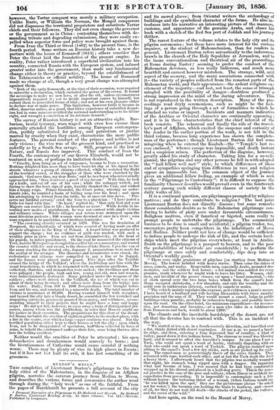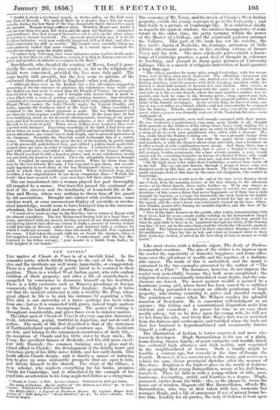BURTON'S MECCA. * THIS completion of Lieutenant Burton's pilgrimage to the
two holy cities of the Mahometanst in the disguise of an Affghan P , narrates the caravan journey from Medina to Mecca, and the various forms and ceremonies the author went
through during the "holy week" as one of the faithful. From the pages of Burekhardt The presents a full account of the city
• Personal Narrative of a Pilgrimage to Ill-Medinah and Afeccah. By Richard Y. Burton, Lieutenant Bombay Army. In three volumes. Vol. III.—Meceah. Published by Longman,. and its snared places ; from Oriental writers the archaeology of buildings and the symbolical character of the forms. He also in- troduces into his narrative an interesting picture of the manners, customs, and appearance of the genuine Arabs, and closes his book with a sketch of the Red Sea port of Jeddah and his journey thither.
The rarest feature of the volume relates to the holy city and its pilgrim ceremonies ; but these have more interest for the curious inquirer, or the student of Mahometanism' than for readers in general. Lieutenant Burton refers sarcastically to the indecorous brawls in the church of the Holy Sepulchre at Jerusalem, and to the inane conventionalism and theatrical air of the proceedings at Rome during Easter ; seeming to prefer the conduct of the Mahometan devotees as less really ludicrous, and much more heartfelt and earnest however mistaken. The strange, wild, arid aspect of the scenery, and the many associations connected with it—the variety of peoples collected from the remotest parts of the Mahometan world, and their appearance—the ardent religious ex- citement of the majority—and last, not least, the sense of triumph mingled with the possibility of danger—doubtless produced a strong impression on the mind of the daring adventurer. This is not reproduced in the written description. Many of the pro- ceedings read dryly ceremonious, such as might be the feel- ings of a person going through a set of formalities to which he attached no value or import. Incidents and manners indicative of the Arabian or Oriental character are continually appearing ; and it is in these characteristics that the chief interest of the book consists. The rehearsal and finally the role of the travel- ler's part of Affghan, which excited the suspense and curiosity of the reader in the earlier portion of the work, is not felt in the third volume, because long experience has shown the complete- ness of the performer ; though Lieutenant Burton did feel some misgiving when he entered the Kaabah—the Temple's last re- cess enclosed," whence escape was impossible, and death instant had a suspicion arisen. The perfection of the disguise, however, greatly aided his study of character. Taking him for a co-reli- gionist, the pilgrims and any other persons he fell in with adopted the "hail fellow well met" style, to which differences of ideas and of sympathies springing from difference in race and religion oppose an =passable bar. The common object of the journey gives an additional fellow feeling, an example of which is seen in the "Pilgrimage to Canterbury ": it is clifficult to suppose the &Hilarity Chaucer describes wou-cl prevail even in the fourteenth century among such widely different classes of society in the daily .walks of life. It la a continual question, are pilgrimages prompted by religious motives; and do they contribute to religion? The last point Lieutenant Burton does not directly discuss but some remarks throw considerable doubts as to the Mahomeian pilgrimage con- ducing to habits of piety save under favourable circumstances. Religious motives, even if -fanatical or bigoted, seem really to prompt people to undertake the pilgrimage. The commercial business to be done is small and ; a pilgrim trader, too, encounters pretty keen competitors in the inhabitants of Mecca and Medina. Neither profit nor lore of change would be sufficient to induce people to undergo the risk of life, and the certain hard- ships which meet the pilgrims everywhere, at least in Arabia. Death on the pilgrimage is a passport to heaven, and to the poor the probabilities of beatitude are considerable ; to perform the pilgrimage at once safely and comfortably, dips deep into an Oriental's worldly goods.
"There were eight gradations of pilgrims Lon starting from Medina to Mecca]. The lowest hobbled with heavy staves. Then came the riders of asses, camels, and mules. Respectable men, especially Arabs, inoluded dro- medaries, and the soldiers had horses : a led animal was saddled for every grandee, ready whenever he might wish to leave his litter. Women, chil- dren, and invalids of the poorer classes, sat upon a ham m l usattalt,'—bits of cloth spread over the two large boxes which fbrm the camel's load. Many occupied shibriyahs, a few shugdufs, and only the wealthy mid the noble rode in taklitrawan (litters), carried by camels or mules. "The vehicle mainly regulates the expense, as it evidences a man's means. I have heard of a husband and wife leaving Alexandria with time months' provision and the sum of Si. They would mount a camel, lodge in public buildings when possible, probably be reduced to beggary, and possibly starve upon the road. On the otherhand, the minimum expenditure—for neeessa- nes, not donations and luxuries,—of a man who rides in a takhtrawan from Damascus and back, would be about 1200/."
The climate and the inevitable hardships of the desert are not • all that the devotee has to contend with. This is an incident of the way.
"We started at ten a. in. in a South-easterly direction, and travelled over a flat, thinly dotted with desert vegetation. At one p.m. we passed a basal- tic ridge and then,. entering a long depressed line of country, a kind of
valley, ridge, down it five tedious hours. The simoom as usual was blowing hard, and it seemed to affect the traveller's temper. In one place I saw a Turk, who could not speak a word of Arabic, violently disputing with an Arab who could not speak a word of Turkish. The pilgrim insisted upon adding to the camel's load a few dry sticks, such as are picked up for cook- ing. The camel-man as perseveringly threw off the extra burden. The screamed with rage, hustled each other, and at last the Turk dealt the Arab a heav blow. I afterwards heard that the pilgrim was mortally:wounded that night, his stomach being ripped open with a dagger. On inquiring what had become of him, I was assured that he had been comfortably wrapped up in his shroud and placed in a half-dug grate. This is the gene- ral practice in the case of the poor and solitary, whom illness or accident in- capacitates from proceeding. It is impossible to contemplate such a fate without horror : the torturing thirst of a wound, (when Indians would say he was killed upon the spot,' they use the picturesque phrase he asked not for water,') the burning sun heating the brain to madness, and—worst of all, for they do not wait till death—the attacks of the jackal, the vulture, and the raven of the wild."
And here again, on the road to the Mount of Mercy.
"Arafat is about a six-heurs' parch, or twelve miles, "on' the Taif road, due East of Meceah. We arrived-there in a shorter time ; but our weary camels, during theliart tiiiict of the'iniy; frequently threw themselves upon the ground. Homan-beings:auffered•more. Between_ Minis; and Arafat I saw no less than 4710:Pah fall iloWit and die upon: the highu:ar:- exhausted mid moribund, they had dragged themselves out to give up the ghost, where it departs to instant beatitude. The spectacle showed how easy it is,to the in thesdlatitudes : each man suddenly staggered,. fell as if shbt, and 'after a brief convulsion lay'still corinrerble. The.corpires were carefully taken up, and carelessly tuned that same evening, in a Vacant space amongst the
crowds encamped- upon the Arafat . . • . "I cannot help -believing that . some unknown cause renders death easier to man in hot than in cold climates ; certain. it is that in Europe rare are the quiet anctpainless deathbeds so common in the East:"
Burekhardt, who dreaded the scrutiny at Mecca, found it prac- tically the easiest place to pass muster, so far tie the religious of- ficials were concerned, provided the fees were duly paid. The same laxity, still prevails, but the fees seem .to.. partake :of the awkward character of hotels in England—what yon please. "Although there were in the Kaabah but a few attendents engaged in preparing it for the entrance of pilgrims, the windowless stone walls and the choked-up door made it worse than the Piombiof Venice • the perspira- tion trickled in large -drops, and- I thought with horror what it must be when filled with a mass of jostling and -crushing fanatics. Our devotions consiated of a two-prostration prayer, followed by long supplications at the Shami (West) corner, the Irald (North) angle, the Yemeni (South), and lastly opposite the Southern third of the back wall. These concluded, I returned to the door, where payment is made. The boy Mohammed told use that the total expense would be seven. dollars. At the same time, he had been indulging aloud in his favourite rhodomontade, boasting of my great- ness and had declared me to be an Indian pilgrini, a race still supposed at MecCah to be made of gold. When seven dollars were tendered they were rejected with instance. Expecting something of the kind, I had been -care- ful to bring no more than eight. Being pulled and interpellated 'by half-a- dozen attendants,. my course was to look stupid, and to pretend ignorance of the language. Presently the Shaybah youth bethought him of a contri- vance. Drawing forth from the press the key of the kaabah, he partly bared it of its green-silk gold-lettered etuf, and rubbed a golden knob quatrefoil- shaped upon my eyes, in order to bn,,_.*Iiten them. I submitted to the opera- tion with good grace, and added a dollar-7my last—to the 'former olienng. The Sherif received it with a hopeless glance, and, to may satisfaction, would not put forth his hand to be kissed. Then the attendants began to demand rails. I replied by opening any empty pouch. When let down from the door by the two brawny Meenuis, I was expected to pay them, and accord- ingly appointed to meet them at the boy Mohammed's house ; an arrange- ment to which they grumblingly assented. When delivered from these troubles, I was congratulated by my sharp companion thus—' Wallah Ef- fendi! thou haat escaped well : some men hard left their skins behind.' "
The eat transformed into a: Woman played her part thoroughly till tempted by a mouse. Our traveller passed the continual or- deal of the caravan and the familiarity of household-life at Me- dina. and Mecca, where was' nothing to throw him off his guard by old associations. Brought into contact with civilization, some careless word, or some unconscious display of scientific or mecha- nical knowledge would seem to have betrayed him to his caravan- attendant, his li:nd,lord and cicerone at Mecca.
"I resolved to Waste no time in the Red Sea, but to return to Egypt with the utmost expedition. The boy Mohammed having laid in a lane, store of grain, purchased with my money, having secured all my disposable articles, and hating hinted that after my return to India a present of twenty dollars would find himat Meccalf, asked leave' and departed with a coolness for which I-could not account. Some days afterwards,' Shaykh Nur explained the cause. I had taken the youtliwith Me on board the steamer' where a bad suspicion crossed his mind. Now, 'understand,' said the boy Mo- hammed. to his fellow servant ; your master is a Sahib from India; he bath !title:led at our beards.'"



























 Previous page
Previous page